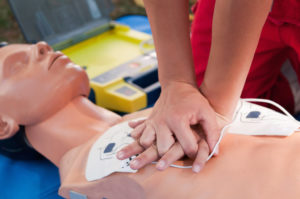 Basic Life Support (BLS)
Basic Life Support (BLS)
Basic Life Support, or BLS, generally refers to the type of care that first responders, healthcare providers, and public safety professionals provide to anyone experiencing cardiac arrest, respiratory distress, or an obstructed airway. This is a certification every Interstaff nurse has to complete before they are cleared to fly to the U.S.
BLS is a training that guarantees proficiency in delivering life-saving interventions for individuals facing critical situations such as:
- Cardiac arrest: Administering high-quality CPR to maintain blood flow until additional assistance arrives.
- Respiratory distress: Identifying and managing breathing difficulties, employing methods like oxygen administration and airway maneuvers.
- Obstructed airway: Clearing blockages caused by food, objects, or swelling to restore vital oxygen intake.
BLS applies to patients of all ages, serving as an essential skill for every nurse, regardless of specialization.
Advanced Cardiac Life Support (ACLS)
ACLS (Advanced Cardiac Life Support) is an advanced certification. It expands on the fundamentals and introduces defibrillation, medication administration, and management of complex cardiac rhythms. This certification is only required for nurses in cardiac-related units.
ACLS training enables nurses to perform crucial life-saving techniques for anyone suffering from potentially life-threatening emergencies, such as:
- Stroke: Recognizing and effectively managing various strokes to minimize tissue damage and maximize recovery potential.
- Other cardiovascular emergencies: Addressing arrhythmias, shock, and other life-threatening situations through a comprehensive and professional clinical approach.
- Cardiac arrest: Employing advanced interventions such as intubation, medication administration, and defibrillation to restore a stable heartbeat.
Requirements
ACLS is only required for Interstaff nurses if the hospital itself requires it. It’s normally required for nurses in cardiac-related units.
All BLS and ACLS certifications must be from the American Heart Association (AHA). There are other companies, but this is the one approved by most hospitals.




